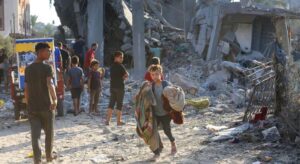
Published 26/12/2022 18:45 | Edited 12/30/2022 3:52 PM
The murder of one of the most respected journalists in Palestine was just one of the most important events that took place in Israel and Palestine in 2022. Many other, even larger ones set up a scenario of Israeli force escalation against Palestinian territories.
It was for events like this that the United Nations declared the deadliest year for Palestinians in the West Bank, occupied since 2006, amid a new shift to the extreme right in the country.
Observers, diplomats and human rights groups have expressed “concern” over Israel’s excessive use of deadly force in the West Bank this year, leading to the high number of killings.
The United Nations Office of the High Commissioner for Human Rights has previously noted that Israeli forces “often use firearms against Palestinians on mere suspicion or as a precautionary measure, in violation of international standards.”
Always Gaza
Less than 15 months after the previous Israeli bombing of the Gaza Strip, the blockaded territory was attacked by Israeli warplanes for three days in early August, killing at least 49 Palestinians, including 17 children.
Another event was the arrest of a Palestinian Islamic Jihad (PIJ) leader in the West Bank by Israeli forces, which raised fears of an escalation, prompting Israel to reinforce its military presence on the border between Israel and Gaza.
On 5 August, Israeli warplanes launched a wave of air strikes on Gaza, to which the PIJ responded by firing rockets at Israel.
Although there were real fears that the outbreak of fighting would lead to a prolonged conflict, especially after the death of the PIJ commanders, the conflict finally stopped after three days, after an Egyptian-brokered truce came into effect.
One of the main reasons for the non-escalation of the conflict was the decision by Hamas, which has ruled Gaza for 15 years, to stay out of the fighting.
Despite this, there has been considerable damage in Gaza, which has barely been rebuilt since the 2021 11-day conflict. And the threat of another protracted outbreak of violence has not gone away, leaving Palestinians in Gaza constantly in fear of what many feel is the inevitable next war.
new armed resistance
One of the key changes in the West Bank in 2022 has been the growth of small armed resistance groups centered in the northern cities of Jenin and Nablus.
The phenomenon began in September 2021 with the formation of the first group, the Jenin Brigades, in the city’s refugee camp following the killing of fighter Jamil al-Amouri by Israel in June.
This was followed in 2022 by the creation of the Nablus Brigades, the Cova dos Leões, the Balata Brigades, the Tubas Brigades and the Yabad Brigades. While the groups are made up of members of various traditional Palestinian parties, the new groups refuse to align themselves with any specific party or movement, which makes matters even more worrisome.
While the groups are limited in terms of their capabilities, they have been focused on engaging Israeli forces in response to near-daily attacks and have also fired on Israeli military checkpoints. They also claimed responsibility for attacks that killed Israeli soldiers and settlers.
The emergence of these groups is the first since the second Intifada (2000-05), when organized groups fought Israeli forces in the West Bank. At the end of that Intifada, or uprising, most of the weapons in the territory passed into the ownership of the Palestinian Authority (PA).
Daily Attacks and Assassinations
After a series of individual attacks on Israel that began in March, Israel launched a military campaign called “Break the Wave”, which included almost daily attacks, mass arrests and killings in the West Bank, with a focus on Jenin and Nablus.
Civilians confronting the Israeli army during attacks and uninvolved bystanders were killed, as were Palestinian fighters in targeted killings and during armed clashes.
Israeli forces killed at least 170 Palestinians in the West Bank and occupied East Jerusalem in 2022, according to the Palestinian Ministry of Health, including more than 30 children. At least 9,000 other people were injured.
Several of the killings have caused particular outrage among Palestinians, including recently on December 12, when a 16-year-old girl in Jenin was shot dead while standing on the roof of her home watching an army attack. A 23-year-old Palestinian was also killed by an Israeli soldier in public on 2 December. The murder was filmed and Palestinians described it as an “execution”.
Assassination of Shireen Abu Akleh
On May 11, Israeli forces shot and killed veteran Al Jazeera journalist Shireen Abu Akleh while she was covering a military operation in the Jenin refugee camp.
Abu Akleh was a 51-year-old Palestinian-American TV correspondent for the Arab broadcaster and covered the Israeli occupation of the Palestinian territories for over 25 years. Her death led to an international outcry and sent shockwaves around the world.
The reporter was honored in a three-day funeral procession that saw an outpouring of grief and respect as her body was transferred from Jenin to Jerusalem.
In East Jerusalem, Israeli forces attacked mourners carrying his coffin. Despite the efforts of Israeli authorities, thousands of Palestinians crowded the streets of Jerusalem for the funeral.
Multiple investigations have found Israel responsible for his murder, with Israel eventually admitting in September that there was a “great possibility” that one of its soldiers had killed Abu Akleh. However, Israeli authorities refused to launch a criminal investigation.
In December, Al Jazeera submitted a formal request to the International Criminal Court (ICC) to investigate and prosecute those responsible for Abu Akleh’s murder.
Rise of the Far Right
In 2022, the fifth Israeli parliamentary elections in less than four years were held. While the results appear to have temporarily ended Israel’s long inability to form a stable government, they resulted in the creation of the most far-right government in the country’s 74-year history.
Prime Minister-designate Benjamin Netanyahu and his Likud party formed an alliance with Zionist and ultra-Orthodox religious parties, winning a majority of 64 in the 120-member Knesset.
The third largest bloc in the election result was the Religious Zionist alliance – a merger of the eponymous party led by Bezalel Smotrich, and the Jewish Power party led by Itamar Ben-Gvir.
The two controversial figures are known for their frequent incitement to violence against Palestinians and have publicly declared their intentions to further illegal Israeli settlement building in the West Bank.
Last year, Smotrich said that Palestinians in Israel “are here by mistake – because [o ex-primeiro-ministro] Ben-Gurion didn’t finish the job” and kicked them out in 1948.
Meanwhile, Ben-Gvir, who has previously called for the deportation of Palestinian citizens “considered disloyal to Israel,” has called on settlers to bear arms and has regularly criticized the Israeli army and government for not using stronger measures against Palestinians.
Increase in settler attacks
Attacks by Israeli settlers against Palestinians in the West Bank have increased and become more brazen and coordinated in 2022.
At least three Palestinians have been killed by settlers this year. Some of these attacks took place while Israeli military forces watched.
“Disturbing evidence that Israeli forces frequently facilitate, support and participate in attacks on settlers makes it difficult to discern between Israeli settlers and state violence,” UN officials said in a statement on December 15.
“2022 is the sixth year of consecutive annual increases in the number of attacks on Israeli settlers in the occupied West Bank,” the statement continued. “Armed and masked Israeli settlers are attacking Palestinians in their homes, attacking children on their way to school, destroying property and burning olive groves and terrorizing entire communities with complete impunity.”
Between 600,000 and 750,000 Israeli settlers live in at least 250 illegal settlements scattered across the West Bank and East Jerusalem.
And Algeria
Source: vermelho.org.br

